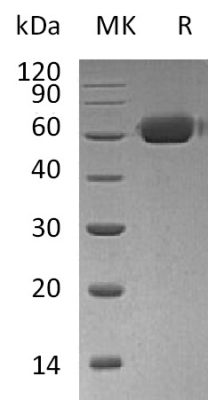| TARGET | |
|---|---|
| SYNONYMS |
Tumor necrosis factor receptor superfamily member 11B;Osteoclastogenesis inhibitory factor;Osteoprotegerin;TNFRSF11B;OCIF;OPG |
| DESCRIPTION |
Recombinant Human Osteoprotegerin is produced by our Mammalian expression system and the target gene encoding Glu22-Leu201 is expressed with a Fc tag at the C-terminus. |
| DELIVERY |
In Stock |
| UNIPROT ID |
O00300 |
| EXPRESSION HOST |
HEK293 |
| TAG |
C-Fc Tag |
| MOLECULAR CHARACTERIZATION |
Not available |
| MOLECULAR WEIGHT |
47.2 KDa |
| PURITY |
Greater than 95% as determined by reducing SDS-PAGE. |
| FORMULATION & RECONSTITUTION |
Lyophilized from a 0.2 μm filtered solution of PBS, pH 7.4. |
| STORAGE & SHIPPING |
Store at -20°C to -80°C for 12 months in lyophilized form. After reconstitution, if not intended for use within a month, aliquot and store at -80°C (Avoid repeated freezing and thawing). Lyophilized proteins are shipped at ambient temperature. |
| BACKGROUND |
TNFRSF11B is a secreted protein, containing 2 death domains and 4 TNFR-Cys repeats. TNFRSF11B is a decoy receptor for the receptor activator of nuclear factor kappa B ligand (RANKL). By binding RANKL, TNFRSF11B inhibits nuclear kappa B (NF-κB) which is a central and rapid acting transcription factor for immune-related genes, and a key regulator of inflammation, innate immunity, and cell survival and differentiation. TNFRSF11B levels are influenced by voltage-dependent calcium channelsCav1.2. TNFRSF11B can reduce the production of osteoclasts by inhibiting the differentiation of osteoclast precursors into osteoclasts and also regulates the resorption of osteoclasts in vitroand in vivo. TNFRSF11B binding to RANKL on osteoblast/stromal cells, blocks the RANKL-RANK ligand interaction between osteoblast/stromal cells and osteoclast precursors. This has the effect of inhibiting the differentiation of the osteoclast precursor into a mature osteoclast. |
| USAGE |
Research use only |
1
/
의
1
Dima Biotech
SKU(재고 관리 코드):PME30024
Human OPG (C-Fc) Protein
Human OPG (C-Fc) Protein
PRODUCT DATA
IMAGES

Figure 1. Greater than 95% as determined by reducing SDS-PAGE.


